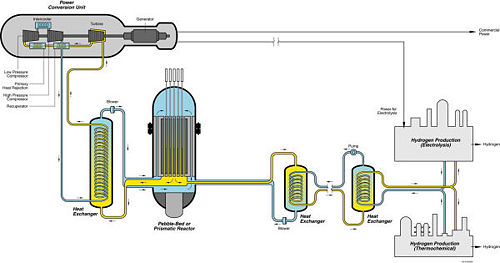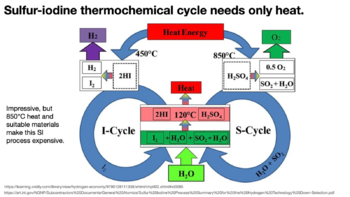High Temperature Gas-cooled Reactor
A candidate for the U.S. Department of Energy Next Generation Nuclear Plant (NGNP), the Very-High-Temperature Reactor (VHTR) is a graphite-moderated, helium-cooled reactor with a once-through uranium fuel cycle. Its primary purpose is to provide high heat(850 to 950 degrees Celsius) to a variety of chemical engineering systems that require substantial heat energy, such as hydrogen generation or petrochemical production. Electrical power generation is an optional and additional goal. supplies heat with high core outlet temperatures which enables applications such as hydrogen production or process heat for the petrochemical industry or others. [1]
It is a relatively small reactor, seen as a nuclear-powered alternative to heating plants now located at industrial plants. Hydrogen generation is one of the major objectives, with hydrogen being seen as a petroleum alternative. Competitive reactors include the uranium hydride reactor by Hyperion Power Generation and the Chinese 200 MW HTR-PB. [2] [3]
Further Reading
China Starts Up First Fourth-Generation Nuclear Reactor
High Temperature Gas-cooled Reactor Technology, two-day course by Hans Gougar at INL, 2019. Nice chart of Process Heat Applications.
References
- ↑ Very-High-Temperature Reactor (VHTR), Idaho National Laboratory, U.S. Department of Energy
- ↑ "United States: Very high temperature gas-cooled reactor could burn 65% of uranium.", TendersInfo, 26 July 2008
- ↑ "Constructing a high-temperature gas-cooled reactor", World Nuclear Performance Report, 2022

